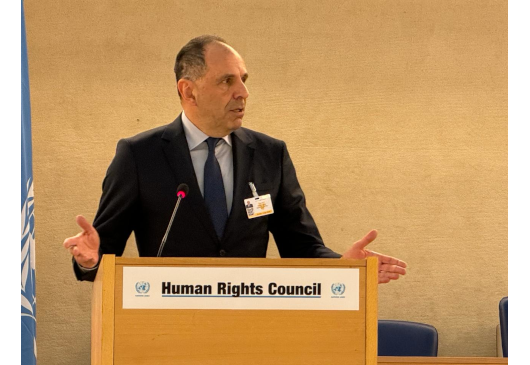 Mr. High Commissioner,
Mr. High Commissioner,
President of the Human Rights Council,
Ladies and gentlemen,
It is a great honor for me to address the High-Level Segment of the 55th Human Rights Council.
And I wish to express our high appreciation for the work of the UN High Commissioner for Human Rights, Volker Türk, and assure him of our continued support.
Mr. President,
Only cohesive societies with robust institutions can provide for functional democracies, peace, and prosperity.
However, the challenges to individual human rights are on the rise.
It has been two years since the illegal and unethical Russian invasion of Ukraine.
We stand by Ukraine in its fight to defend its sovereignty and territorial integrity, because this constitutes a defense of the values of liberal democracy and of International Law against aggression and revisionism.
At the same time, in the Middle East, humanitarian principles are being seriously tested, with tragic loss of civilian lives and the use of hostages as a bargaining tool, in a blatant violation of human value.
While humanitarian aid needs to continue uninhibitedly, hostilities ought to stop immediately, and peace should be fully restored.
We are also mindful about ongoing conflicts worldwide, where the rights of women and children are substantially violated and, of course, in the Red Sea, where the safety of navigation is crucially jeopardized.
Greece, following a rule-based foreign policy, will continue to strongly oppose any illegal use of force and to advocate for the peaceful settlement of disputes and the full respect for International Law.
Mr. President,
Greece domestically follows a specific pattern when it comes to human rights policies.
We employ multi-facets strategic masterplans for the protection of vulnerable groups, based on the principles of non-discrimination and diversity.
In this vane, we implement several Action Plans, among others, on: Gender Equality, Protection of Minors, Equal opportunities for Persons with Disabilities, integration of Refugees, LGBTQI+ rights.
Only a few days ago, the Hellenic Parliament adopted a new Law providing for same sex marriage.
As of 2015, the Hellenic Coast Guard has saved more than half a million lives of migrants at the seas, whereas all applicants for refugee status are provided with humane living conditions and speedy processing of their applications.
And we constantly place particular emphasis on the Muslim minority of Thrace, in the north-east part of Greece, as its members enjoy both special protection as a minority and their full rights as Greek and EU citizens.
All these, despite totally unsubstantiated comments heard yesterday in this room.
The demographic development of the Minority in the last 100 years is an eloquent proof that it continues to thrive and prosper.
Mr. President,
For more than 20 years, in my capacity as Professor of Constitutional Law, before joining politics, I was trying to convey to young people the need to respect universal and indivisible rights.
Yet, the current situation calls for an imminent revisit of traditional concepts of human rights law.
Rights that have been overlooked for decades need to come to the forefront.
Among others, the right to food and water and the right of enjoyment of a peaceful life, including the overall prohibition of any form of forcible or de facto displacement of people.
But also, the rights of future generations, including the obligation of states to apply resilient and sustainable policies against climate crisis and against overconsumption of natural capital.
And, above all, world leaders must identify and set in place mechanisms effectively to implement rights protected by International Law and, primarily, the UN Universal Declaration of Human Rights.
No one should be able to escape without being held accountable for actions violating globally acknowledged rights.
Based on these premises, Greece is presenting its candidacy as a non-permanent member of the UΝ Security Council for 2025-26, as well as its candidacy for membership to the Human Rights Council for the period 2028-2030.
To this end, we will continue our support to effective multilateralism, thus working closely with all countries and all UN Human Rights mechanisms, to safeguard and advance freedom, equality, and inclusivity.
There is no room for delay. Yesterday is lost, tomorrow might be too late.
I thank you.
February 28, 2024


